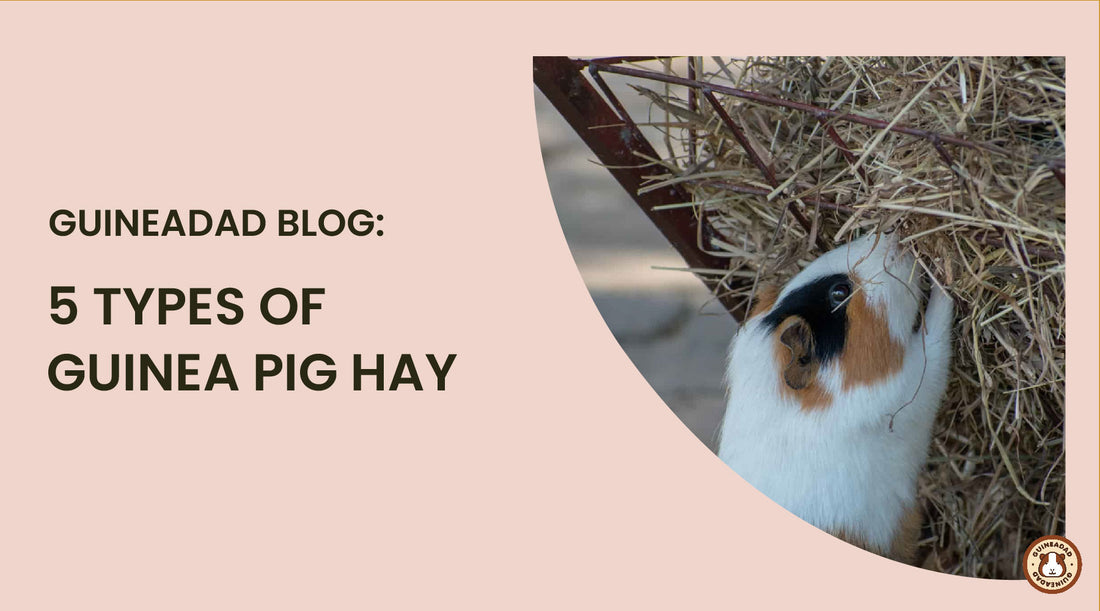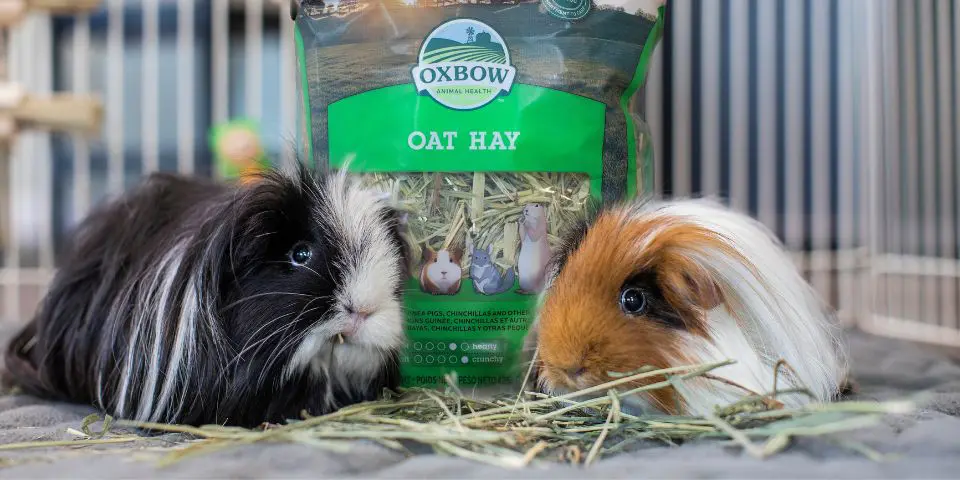Discover various types of hay for guinea pigs and their unique benefits to meet their dietary needs. Timothy hay, orchard grass, and alfalfa hay are popular choices due to their high fiber content and essential nutrients.
Guinea pigs thrive on a diet rich in high-quality hay, which aids in digestion and promotes dental health. Each type of hay offers distinct advantages, ensuring a well-rounded nutritional profile for your furry companions. Understanding the differences between these hay varieties enables you to provide the best care for your guinea pigs, supporting their overall well-being and happiness.

Credit: guineadad.com
Contents
Introduction To Guinea Pig Nutrition
Explore the world of guinea pig nutrition with a focus on the different types of hay. Discover the benefits of various hays to provide your furry friends with a balanced and healthy diet. From timothy hay to orchard grass, find the ideal option to support your guinea pigs’ well-being.
When it comes to keeping your guinea pigs healthy, nutrition plays a crucial role. Providing a well-balanced diet is essential for their overall well-being. One of the key components of a guinea pig’s diet is hay. Hay serves as a vital source of fiber, which aids in proper digestion and prevents various health issues.
Importance Of Hay
Hay is an essential part of a guinea pig’s diet for several reasons. It provides the necessary fiber content that helps maintain their digestive health. Guinea pigs have a unique digestive system that requires a constant supply of roughage to keep their teeth worn down and their gut functioning properly. Hay also promotes healthy gut bacteria and prevents conditions like diarrhea and bloating.
Basic Dietary Needs
A guinea pig’s basic dietary needs consist of hay, fresh vegetables, and a small amount of pellets. However, hay should constitute the majority of their diet. It is recommended to provide unlimited access to fresh, high-quality hay, such as Timothy hay or orchard grass. These types of hay are rich in nutrients and low in calories, ensuring your guinea pig maintains a healthy weight.
Additionally, hay is essential for the dental health of guinea pigs. Their teeth grow continuously throughout their lives, and chewing on hay helps wear them down naturally, preventing dental problems.
Guinea pigs are herbivores, and their digestive system is designed for a high-fiber diet. Providing a variety of hays, such as meadow hay or oat hay, can add enrichment to their diet and prevent boredom. It is important to introduce hay gradually to ensure a smooth transition and avoid any digestive upsets.
In conclusion, hay is a crucial component of a guinea pig’s diet. It provides the necessary fiber, promotes proper digestion, and helps maintain dental health. Offering a variety of hays ensures a well-rounded and nutritious diet for your furry companions.
Varieties Of Hay
When it comes to caring for your guinea pigs, providing them with the right type of hay is essential for their health and well-being. Different varieties of hay offer unique nutritional benefits and textures that can cater to the specific needs of your furry companions. Let’s explore the various types of hay commonly recommended for guinea pigs and their respective advantages.
Timothy Hay
Timothy hay is a popular choice for guinea pigs due to its high fiber content and low calcium levels, making it ideal for maintaining digestive health and preventing urinary tract issues. This type of hay is known for its long strands and coarse texture, which encourages natural chewing behavior, promoting dental wear and reducing the risk of overgrown teeth.
Alfalfa Hay
Alfalfa hay is rich in protein, calcium, and other essential nutrients, making it a suitable option for growing guinea pigs, pregnant or nursing sows, and underweight pigs. However, due to its higher calcium content, it is generally not recommended for adult guinea pigs, as excessive calcium intake can lead to urinary stones and other health issues.
Orchard Grass Hay
Orchard grass hay is another excellent choice for guinea pigs, offering a softer texture compared to Timothy hay. It is low in calcium and high in fiber, providing essential nutrients while being gentle on the digestive system. The softness of orchard grass hay makes it a favorite among picky eaters and senior guinea pigs with dental problems.
Analyzing Timothy Hay
When it comes to guinea pig nutrition, Timothy hay is a popular choice due to its excellent nutritional profile and numerous benefits for adult guinea pigs. Let’s take a closer look at the nutritional content and the advantages of including Timothy hay in your guinea pig’s diet.
Nutritional Content
Timothy hay is rich in fiber, which is essential for maintaining proper digestive health in guinea pigs. It also contains a balanced ratio of calcium and phosphorus, promoting healthy teeth and bones. Additionally, Timothy hay is low in fat and calories, making it an ideal choice for maintaining a healthy weight in guinea pigs.
Benefits For Adult Guinea Pigs
- Supports Digestive Health: The high fiber content of Timothy hay helps prevent digestive issues such as bloating and gastrointestinal stasis.
- Promotes Dental Health: Chewing on Timothy hay helps wear down guinea pigs’ continuously growing teeth, preventing dental problems.
- Weight Management: With its low fat and calorie content, Timothy hay supports weight control and prevents obesity in adult guinea pigs.
The Role Of Alfalfa Hay
Alfalfa hay is one of the most commonly used types of hay for guinea pigs. It is known for its high nutritional value and is often recommended for young, growing guinea pigs, as well as pregnant or nursing females. This type of hay is rich in calcium, making it an important part of a guinea pig’s diet. However, due to its high calcium content, it should be given in moderation to adult guinea pigs to prevent the risk of urinary problems.
Richness In Calcium
Alfalfa hay is known for its richness in calcium, which is essential for guinea pigs’ overall health. Calcium plays a crucial role in maintaining strong bones and teeth, as well as supporting proper muscle function. It is particularly important for young guinea pigs, as they are in a phase of rapid growth and development. However, excessive calcium intake can lead to urinary issues, such as bladder stones or sludge, in adult guinea pigs. Therefore, it is crucial to provide alfalfa hay in appropriate amounts based on your guinea pig’s age and specific needs.
When To Feed To Guinea Pigs
Knowing when to feed alfalfa hay to your guinea pigs is essential to ensure their optimal health. As mentioned earlier, this type of hay is beneficial for young guinea pigs, pregnant or nursing females, and guinea pigs recovering from illness or surgery. For adult guinea pigs, it is recommended to transition them to timothy hay or other grass hays, which have lower calcium content. This helps prevent urinary problems that can arise from excessive calcium intake. Always consult with a veterinarian to determine the right balance of hay for your guinea pig’s specific needs.
Remember, hay is a vital part of a guinea pig’s diet, and offering a variety of hays can provide them with different nutrients and textures. By understanding the role of alfalfa hay and when to feed it, you can ensure that your guinea pig receives a well-balanced diet that supports their overall well-being.
Orchard Grass Hay Features
Orchard grass hay is a popular choice for guinea pig owners due to its unique features that cater to the specific needs of these adorable pets.
Taste And Texture
Orchard grass hay is known for its soft texture and sweet taste, making it an appealing option for guinea pigs. The fine, leafy strands make it easy for these small animals to chew and digest, promoting healthy dental and digestive functions.
Suitability For Sensitive Pigs
Orchard grass hay is gentle on the digestive system, making it an ideal choice for guinea pigs with sensitive stomachs. It is low in calcium and high in fiber, reducing the risk of urinary tract problems and supporting overall gut health.
Health Benefits Of Hay
When it comes to guinea pig care, the health benefits of hay cannot be overstated. Hay is a crucial component of a guinea pig’s diet, providing essential nutrients and aiding in various aspects of their well-being.
Dental Health
- Keeps teeth trimmed and healthy
- Prevents dental issues like overgrowth
Digestive Health
- Aids in digestion and prevents blockages
- Regulates gut motility
Behavioral Enrichment
- Encourages natural foraging behavior
- Provides mental stimulation
Serving Hay To Your Guinea Pig
When serving hay to your guinea pig, it’s crucial to consider their daily requirements and best practices for freshness. Hay is an essential part of a guinea pig’s diet, providing necessary fiber and promoting dental health.
Daily Hay Requirements
Guinea pigs need a constant supply of fresh hay to support their digestive system and keep their teeth healthy. Aim to provide unlimited amounts of hay daily to ensure your furry friend’s well-being.
Best Practices For Freshness
- Store hay in a cool, dry place away from sunlight and moisture.
- Check for any signs of mold or dust before serving to your guinea pig.
- Replace hay daily to maintain freshness and quality for your pet.

Credit: oxbowanimalhealth.com
Common Questions Answered
Common Questions Answered:
Mixing Different Hays
It’s safe to mix hay varieties to provide a diverse diet.
Allergic Reactions To Hay
Some guinea pigs may have allergies to certain hays.
Alternatives To Hay
Consider alternatives like fresh herbs or leafy greens.
Purchasing And Storing Hay
When it comes to purchasing and storing hay for your guinea pigs, it’s essential to choose the right type of hay and store it correctly to maintain its freshness and nutritional value.
Selecting Quality Hay
Look for fresh, green, and fragrant hay with a mix of grasses and legumes for a well-rounded diet.
Storage Tips To Retain Freshness
- Store hay in a cool, dry, and well-ventilated area away from sunlight.
- Use airtight containers or bags to prevent moisture and mold.
- Rotate hay stock to use older batches first and maintain freshness.

Credit: guineadad.com
Frequently Asked Questions
What Is The Best Type Of Hay For Guinea Pigs?
The best type of hay for guinea pigs is Timothy hay. It is low in calcium and high in fiber which helps maintain healthy teeth and digestive system. It also has a good balance of nutrients that guinea pigs need.
Can Guinea Pigs Eat Alfalfa Hay?
Guinea pigs can eat alfalfa hay, but it should only be given in small amounts as it is high in calcium and protein. It is best for young guinea pigs and pregnant or nursing guinea pigs as they require more nutrients.
How Often Should Guinea Pigs Be Given Hay?
Guinea pigs should have access to hay at all times as it is an essential part of their diet. They should be given fresh hay every day to ensure they have access to the nutrients they need. A good rule of thumb is to provide a handful of hay per guinea pig per day.
Conclusion
Choosing the right type of hay for your guinea pig is essential for their overall health and well-being. Timothy hay is the most common and recommended type of hay, but other varieties like orchard grass, meadow hay, and alfalfa hay can also provide unique benefits.
It’s important to consider your guinea pig’s specific needs and preferences when selecting a hay type. Providing high-quality hay is a crucial aspect of guinea pig care and can contribute to a happy and healthy pet.


